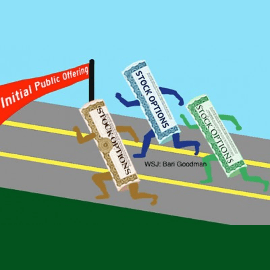IPO allocations are the pits if you are a financial adviser.
You indicate a 50,000-share interest in the new offering. Then, on the day trading begins, you may get 100 shares and an ‘attaboy’ to spread around your clients.
Painful.
Because of experiences like that, I decided to leanr how to invest in shares properly and also developed an interest in broker-dealers that give high-net-worth investors the opportunity to buy shares in private companies, like Twitter or Alibaba, before they go public.
What a great way to end the heartbreak of IPO allocations, I thought. Advisers can do their homework, explain the substantial risks to their clients, and circumvent the jerks who run syndicate.
But first I had some questions. Why are these deals even possible? How are they getting done? And who can participate?
I got some answers from SharesPost Inc., a San Francisco-based broker dealer that enables investors to buy shares in private companies, like Palantir or Dropbox, among many others. I spoke with Greg Brogger, the chairman and founder, and with Sven Weber, who runs the SharesPost 100 Fund for the company.
“If you look at the profile of technology companies that IPO,” says Mr. Weber, “they have changed.” Companies like Apple or Microsoft typically spent “six to eight years” as private entities before going public. Today, it’s more like “10 to 12 years,” and by then, their shares are close to being fully valued.
Layer on the economics of job-hopping in Silicon Valley. Upon resignation, employees typically have 60 to 90 days to exercise their options or forfeit any increase in value over the strike prices. The costs, including taxes, can be prohibitive for someone who has, say, 100,000 vested options struck at $10 each.
That’s why outside investors, subject to issuer approval, offer a solution. They exercise the options, pay the departing employee a premium over their strike price, and acquire shares of companies that appear destined for IPOs.
These trades, according to Mr. Weber, enable investors to “access huge growth two, three, or four years before the IPO.”
I asked Mr. Brogger whether licensed, third-party financial advisers, working for firms other than SharesPost, can market these investments to their HNW clients.
Yes and no, he explained.
Click here to continue reading on the Wall Street Journal.


 The New York Times describes my novels as “money porn,” “a red-hot franchise,” and “glittery thrillers about fiscal malfeasance.” Through fiction I explore the dark side of money and the motivations of those who have it, want more, and will steamroll anybody who gets in their way.
The New York Times describes my novels as “money porn,” “a red-hot franchise,” and “glittery thrillers about fiscal malfeasance.” Through fiction I explore the dark side of money and the motivations of those who have it, want more, and will steamroll anybody who gets in their way.